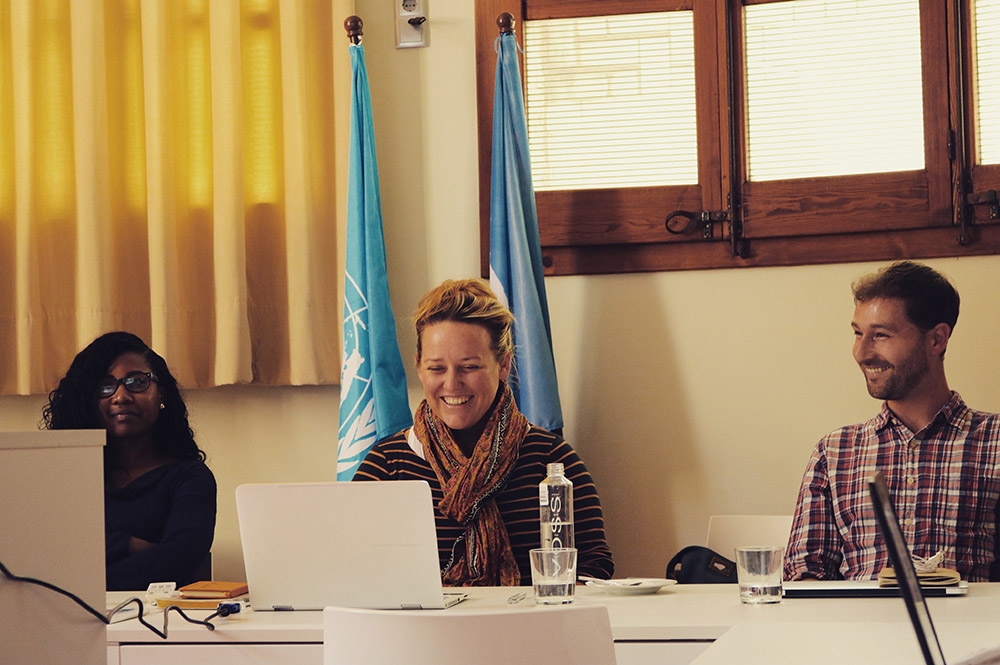 We recently caught up with former student Walker Toma (1986), a former land use economist from Berkeley, California who completed our program in 2017. After completing his internship with UN-Habitat during the course , Walker transitioned into a full-time position with the agency; in the following interview he talks to us about how what his new job entails and how the program has impacted his career so far.
We recently caught up with former student Walker Toma (1986), a former land use economist from Berkeley, California who completed our program in 2017. After completing his internship with UN-Habitat during the course , Walker transitioned into a full-time position with the agency; in the following interview he talks to us about how what his new job entails and how the program has impacted his career so far.
 Name: Walker Toma
Name: Walker Toma
Age: 31
Nationality: USA
Occupation: Former land use economist, current job title is Urban Resilience Specialist
Location: Barcelona
Area of interest/specialty: Specialization in urban economics, public policy, and real estate
Professional goal: Give a TED talk
What have you done since graduating from our program?
Since graduating, I’ve remained here in Barcelona with my wife Ryan and dog Lionel. I was offered a job with UN-Habitat working on city resilience following my internship and am currently pursuing a doctorate at UIC assessing how adaptive reuse can be used in European cities to address housing demands for vulnerable groups while also building resilience.
Tell us about your current job. How did you land it?
My current job is within the City Resilience Profiling Programme (CRPP), which is part UN-Habitat. Towards the end of my internship last summer, I asked the bosses if they’d hire me and they said yes!
What are your responsibilities, and what does a regular workday involve?
My responsibilities include research and analysis on a variety urban issues. For instance, many of my days are spent researching how certain urban systems (e.g. transportation infrastructure, informal economies or law enforcement) relate to resilience. Using this research, I help develop indicators that will support the creation of profiles of our partner cities. These profiles will inform recommended actions for building local resilience developed in collaboration with local governments of partner cities. I have also begun to support the development of different publications and proposals as a primary author and editor.
Tell us about a specific project you are working on.
One of my roles here is to support (technically and strategically) a colleague in Port Vila, Vanuatu, in her efforts engaging the local government and collecting data as part of implementing the City Resilience Profiling Tool (CRPT). I will hopefully have an opportunity to go to Port Vila in the coming months.
In what ways did the master program influence your professional life? Did your internship prepare you well for your future roles?
Before entering into the master program, I had very little exposure to the UN, or really the entire humanitarian/development industry. So in that respect, the masters opened my eyes to some of the opportunities outside of the public and private sectors.
Yes, as my internship was with UN-Habitat, it was the only reason I ever would have been hired here, or even applied. In terms of preparation for future roles, as the job has been more or less a continuation of the internship (though with financial incentives!), it certainly was a great benefit to me in my current position.
Tell us one of your most memorable experiences related to your work.
In April, three colleagues and I were invited by the Generalitat of Barcelona to attend a conference in Mallorca on Smart Island Cities. Aside from my boss contributing to a panel discussion, two colleagues and I were tasked with facilitating a three hour workshop on city resilience and the Tool our program is developing. After quite a bit of preparation—3 hour workshop—only 4 people attended… It was quite memorable!

Are there any mistakes you have learned from?
Perhaps not to be characterized as a mistake, but I’ve been quite surprised at how political the UN environment can feel given its lofty origins, ideals, vision, etc. What I mean is, while my office surely possesses its fair share of strategic, internal maneuvering, I’ve been surprised at the degree to which associated programs, offices, and branches we work with on occasion vary in their working relationship with our staff/office. For instance, there exist frictions between certain different organizations, the result of which is a difficult working relationship or simply no collaboration at all.
What have you found to be the most challenging aspects of your job or of working in development in general?
Learning all the acronyms and administrative structures and partnerships involved in the humanitarian/development/NGO world is exhausting. I still am pretty clueless as to what I am reading about most of the time.
What advice would you give to our students or anyone interested in a similar career path?
The most valuable contribution I bring to my office is my experience from outside of the “development” sector. As the work, be it in the field or in a climate controlled office like mine, is multifaceted, having a breadth of experience and educational background is really helpful on a day-to-day basis.
What do you enjoy or value most about the career path you’ve chosen?
I certainly haven’t chosen a career path but I am excited about exploring the idiosyncrasies of a new industry. So far I value most the people I’ve had the opportunity to work with, as they come from such a diversity of backgrounds and professional fields.
__
Photos by Maria Poppalova/UN-Habitat

